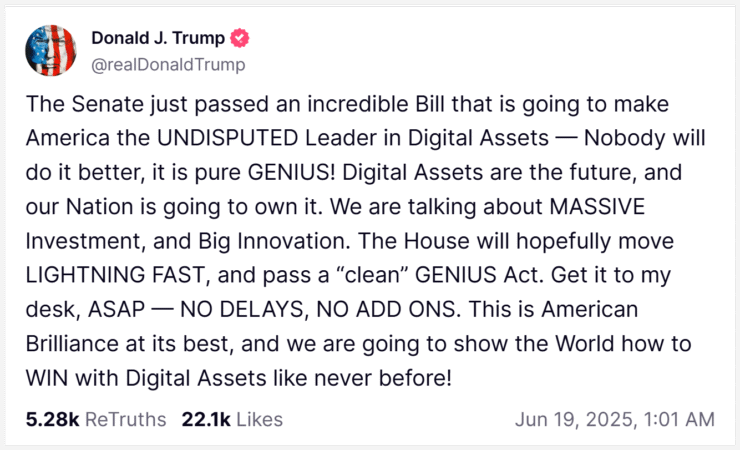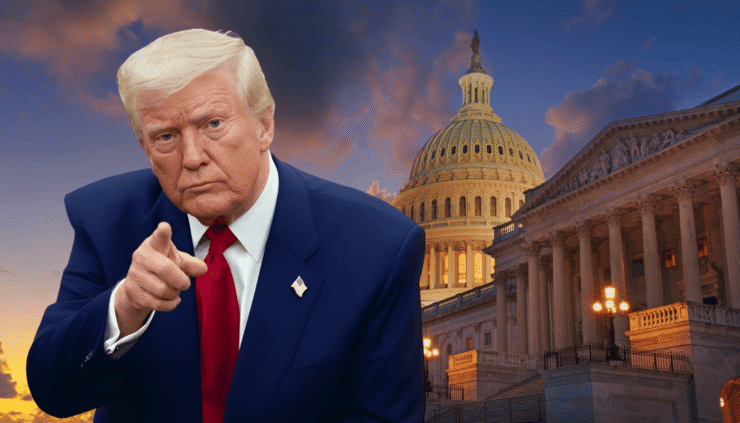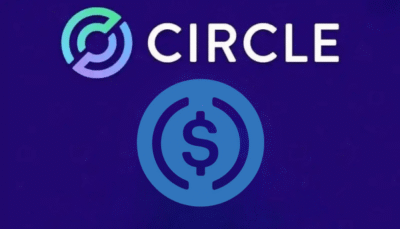President Donald Trump is urging the U.S. House of Representatives to act swiftly on the GENIUS Act, a landmark stablecoin bill that recently cleared the Senate with bipartisan support. In a Truth Social post on Thursday, Trump called the legislation “incredible,” asserting that it would make the United States “the UNDISPUTED Leader in Digital Assets.”
He followed up with a forceful demand: “Get it to my desk, ASAP — NO DELAYS, NO ADD ONS,” pushing for the bill to be passed “LIGHTNING FAST.”

The Senate passed the Guiding and Establishing National Innovation for US Stablecoins (GENIUS) Act earlier this week in a 68–30 vote, demonstrating broad momentum behind efforts to set clear federal standards for payment-based stablecoins. Although the House holds a narrow Republican majority and is expected to be more receptive, the bill will still require quick legislative coordination to move forward.
The GENIUS Act sets out strict guidelines for reserve backing, transparency, and licensing. It aims to strike a balance between consumer protection and fintech innovation. Trump’s endorsement reflects his recent pivot toward pro-crypto policy, a shift that’s turning digital assets into a key battleground ahead of the 2024 election.
With rising institutional interest and regulatory pressure converging, the administration’s stance could accelerate the integration of stablecoins into U.S. finance—and potentially set a global precedent for digital asset regulation.
Bill Framed as a Defense of Dollar Dominance
Backers of the GENIUS Act argue the bill’s implications go far beyond crypto regulation—it could be pivotal in maintaining the U.S. dollar’s dominance in global finance. By standardizing stablecoin issuance, the bill aims to reinforce the digital relevance of the dollar as global competition heats up.
Senator Bill Hagerty, who sponsored the bill, noted its potential to modernize U.S. payments. “Businesses of all sizes and Americans across the country will be able to settle payments nearly instantaneously,” he said, contrasting the bill’s goals with current banking inefficiencies.
The legislation’s journey has been politically charged. It previously failed a cloture vote in May, largely due to Democratic pushback over Trump’s growing influence in the digital asset space.
Senator Elizabeth Warren remains a vocal critic, accusing Trump of having financial interests in USD1, a stablecoin allegedly connected to his family. This controversy continues to fuel partisan debate over the bill’s motivations.
Still, with Senate approval now secured and a House vote pending, the GENIUS Act could reshape the regulatory framework for stablecoins—and shift the global power dynamics of digital payments.
Bill Sets Tough Rules for Stablecoin Issuers
At the heart of the GENIUS Act is a comprehensive framework to regulate payment stablecoins. The bill mandates that all dollar-backed tokens be fully reserved and issued only by licensed entities at either the state or federal level.
Core provisions include Anti-Money Laundering (AML) compliance, robust consumer safeguards, and tight restrictions on how reserves may be used. To minimize systemic risk, stablecoin issuers would be prohibited from using reserves for anything other than redemptions or ultra-safe instruments such as U.S. Treasury repurchase agreements.
These measures aim to prevent a recurrence of crypto-induced banking failures while enabling innovation within a secure and transparent regulatory perimeter.
Quick Facts
- The GENIUS Act passed the Senate 68–30, moving to the House next.
- Trump urged Congress to pass the stablecoin bill “LIGHTNING FAST.”
- The bill mandates 1:1 reserve backing and strict licensing.
- Critics claim Trump has personal stakes in the USD1 stablecoin.





